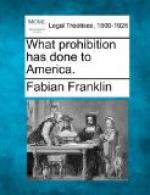CHAPTER XI
Is there any way out?
In the second chapter of this book, I undertook to give an account of the state of mind which the enactment of the Eighteenth Amendment has created, and which is at the bottom of that contempt for the law whose widespread prevalence among the best elements of our population is acknowledged alike by prohibitionists and anti-prohibitionists. “People feel in their hearts,” I said, “that they are confronted with no other choice but that of either submitting to the full rigor of Prohibition, of trying to procure a law which nullifies the Constitution, or of expressing their resentment against an outrage on the first principles of the Constitution by contemptuous disregard of the law.” It is a deplorable choice of evils; a state of things which it is hardly too much to call appalling in its potentialities of civic demoralization.
And one who realizes the gravity of the injury that a long continuance of this situation will inevitably inflict upon our institutions and our national character must ask whether there is any practical possibility of escape from it. The right means, and the only entirely satisfactory means, of escape from it is through the undoing of the error which brought it about—that is, through the repeal of the Eighteenth Amendment. Towards that end many earnest and patriotic citizens are working; but of course they realize the stupendous difficulty of the task they have undertaken. As a rule, these men, while working for the distant goal of repeal of the Amendment, are seeking to substitute for the Volstead act a law which will permit the manufacture and sale of beer and light wines; a plan which, as I have elsewhere stated, while by no means free from grave objection—for it is clearly not in keeping with the intent of the Eighteenth Amendment—would, in my judgment, be an improvement on the present state of things. But it is not pleasant to contemplate a situation in which, to avoid something still worse, the national




